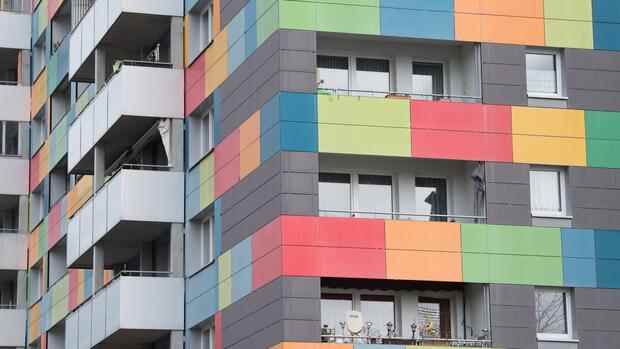Berlin Leading politicians of the SPD Left see an urgent need for action to protect tenants from inflation-related rent increases. “Vonovia and other real estate companies regularly show that they have dollar signs in their eyes and act completely irresponsibly,” said the co-chairman of the Democratic Left Forum in the SPD (DL21), Sebastian Roloff, the Handelsblatt. However, housing is “one of the social issues of our time”.
That is why the state must “intervene if the market is massively imbalanced,” emphasized Roloff. “A temporary freeze on rents, a municipal right of first refusal and a deprivatization of real estate groups are necessary and suitable means that are now required.”
The national chairman of the Jusos, Jessica Rosenthal, considers this unacceptable. “Housing is a human right and must never become an object of speculation,” she said. SPD General Secretary Kevin Kühnert accused Buch of acting “boldly and transparently” in view of the “breathtaking profits” that his company is bringing in.
Top jobs of the day
Find the best jobs now and
be notified by email.
Green housing politician Christina-Johanne Schröder had already threatened to strengthen tenancy law.
FDP warns against socialist measures
The FDP sees the advances of the Greens and SPD critically. “We need more apartments, not more state intervention,” said the federal deputy of the Liberals, Wolfgang Kubicki. He warned the SPD against “socialist measures”.
“The nationalization of real estate groups does not create a single apartment, but only means that the scarce living space is transferred to other hands,” said the FDP politician. This would not help anyone, except for the real estate companies, which would have to be paid a lavish compensation price that was customary in the market from tax revenue.
Vonovia boss Buch had said that without rent increases, many landlords would get into serious trouble. “We can’t pretend that inflation is bypassing rents. It won’t work,” said Buch.
The head of the SPD workers’ wing, Cansel Kiziltepe, does not share the assessment. “Housing companies are coming together without being able to explain to what extent inflation should have cost effects on existing apartments,” said the parliamentary state secretary in the Federal Ministry of Building.
It is “completely unclear” which apportionable costs should justify the massive rent increases. “Social responsibility in these times looks different.”
Haus & Grund: “No automatism” for rent increases
Kai Warnecke, President of the Haus & Grund owners’ association, also said that “not all cost items develop in line with inflation”. That’s why the conclusion that Vonovia boss Buch drew was “wrong”. There is “no automatism” that rents will have to rise across the board if inflation is higher.
He accused the SPD of populism and warned against a debate about tightening tenancy law. “We have an incredibly huge task ahead of us, namely the energetic modernization of the building sector,” said Warnecke. “It’s almost impossible to solve, both technically and financially. Anyone who comes now with a rent freeze has not recognized the signs of the times.”
The housing market is tight, especially in big cities.
(Photo: imago images/Bernd Friedel)
Vonovia rents out more than 505,000 apartments in Germany. At the presentation of the 2021 annual balance sheet in mid-March, the board of directors reported that the average rent had increased to EUR 7.33 per square meter – that was 2.4 percent more than a year earlier.
A Vonovia spokeswoman assured that the company will continue to adhere to the promise for its own housing stock in Berlin that rents will not rise more than one percent on average for the next three years and then no more than inflation. In addition, common solutions could be found in cases of hardship.
>> Read also: Intervention in the housing market: What Geywitz is planning for the municipal right of first refusal
SPD politician Kiziltepe is not convinced. “Instead of backing people up with rent restraint in the current climate, some housing companies are threatening to become inflation free riders,” she said. “Unfortunately, we have to fear that this will fill the coffers for further takeovers and dividend increases.”
According to the German Tenants’ Association (DMB), Vonovia had made a profit of around EUR 1.7 billion in the 2021 pandemic year and paid out the highest dividend in the company’s history at EUR 1.66 per share.
SPD: Index leases to the test
Juso boss Rosenthal wants to react with a “mix of measures” and “sustainably relax” the housing market in order to protect tenants. What is needed is a “temporary rent freeze,” she said. Like her party colleague Roloff, Rosenthal is also in favor of a municipal right of first refusal to prevent real estate speculation.
The point is that the cities can protect tenants from displacement by buying houses. The federal government has already taken up the issue. A draft law by Federal Building Minister Klara Geywitz (SPD) is currently undergoing internal government coordination.
More Handelsblatt articles on the challenges in the housing market:
The SPD housing politician Bernhard Daldrup spoke of “bad news” for tenants in view of the Vonovia announcement. He sees a need for action when it comes to the type of lease: “So-called index leases, which link rent to inflation, pose a greater challenge, and politicians should react to them.”
Kubicki advocated “stimulating market forces”. He also suggested easier private investment opportunities, a “generous” expansion of building land, a reduction in land transfer tax and a “massive” reduction in building regulations.
More: The crux of the heat transition – what makes the switch to climate-friendly heating systems so difficult
